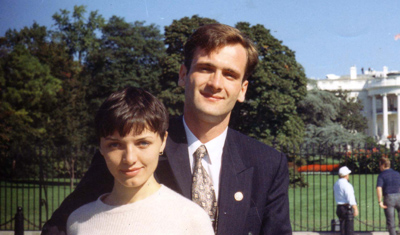Seeking justice for murdered journalists

Sixteen years ago, renowned Ukrainian investigative journalist Georgy Gongadze was brutally beheaded in retaliation for his reporting that exposed government corruption.
Gongadze’s widow, Myroslava, escaped to the U.S. with their young daughters and now heads up Voice of America’s Ukrainian Service. An award-winning journalist in her own right, Myroslava is widely and deservedly regarded as a champion of democracy, independent media, and the rights of journalists everywhere.
But to this day, the mastermind of her husband’s murder remains free.
Sadly Myroslava’s story is not rare. Since 1992, almost 800 journalists have been murdered for nothing more than simply reporting the news. In nine out of ten of these cases, their killers will go unpunished.
This grave failure of justice for our fallen colleagues is a travesty. We must not only honor their memory and their brave legacies, but also urge governments around the world to immediately end impunity for those who have committed crimes against journalists.
This week the United Nations marked the International Day to End Impunity for Crimes Against Journalists to remind us all how dangerous telling the truth can be and to urge us to action to prevent individuals and governments from getting away with murder.
Impunity – defined as the failure to bring perpetrators of human rights violations to justice – is endemic in societies that lack a free press, and it erodes journalists’ ability to hold people and institutions accountable.
But in the communities where it takes root, impunity for crimes against journalists damages far more than just the free press. Where journalists are killed for reporting the news – and where governments fail to serve justice to their perpetrators – other human rights violations, crime, and corruption are far more common.
Unfortunately, despite the world’s increasing focus on ending its destructive power, impunity for crimes against journalists remains a serious problem.
This October, the Committee to Protect Journalists released its annual Impunity Index, which lists the 13 countries where at least five journalists have been murdered without a single perpetrator being convicted. The countries on CPJ’s rankings are some of the most dangerous and press-restricted places on earth, including Iraq and Syria, which ranked 2nd and 3rd overall, where ISIL continues to brutally and publically murder journalists in an effort to hold the information space hostage.
The issue of impunity is one that is close to our hearts each and every day. It is the mission of the networks of the Broadcasting Board of Governors (Voice of America, Radio Free Europe/Radio Liberty, Middle Eastern Broadcasting Networks, Radio Free Asia and the Office of Cuba Broadcasting) to inform, engage and connect people around the world in support of freedom and democracy.
As such, our journalists, in their quest to bring accurate and reliable news and information to the people, operate in incredibly dangerous spaces. Along with brave local journalists, they are hard at work in the front lines of the news, where rule of law is weak and where endemic and brutal violence tears at communities, and in countries where authoritarian governments seek to censor objective voices and crack down on civil society.
For example, BBG’s Middle Eastern Broadcasting Networks provides alternative perspectives to the extremist information and tackles the root issues that feed ISIL propaganda. MBN’s multi-platform campaign, Raise Your Voice, encourages Iraqi citizens to speak out and address extremism and the underlying causes of terrorism. Through new radio and television programs and digital properties, the campaign provides forums for activists, youth, and others to share their ideas on topics such as sectarian relationships, religious freedom, and freedom of expression.
And in Nigeria, which ranked 12th, reporters with VOA Hausa Service travel deep into Boko Haram territory in order to file reports that may very well be the only source of unbiased news available.
Our journalists – and indeed journalists the world over – accept the potential risks to their lives as they pursue the truth. But they should never be forced to consider, even for a moment, that justice will not be served should the worst happen.
In free societies such as the United States it is easy to take for granted the rule of law, or the many alternative voices and debates allowed by our open press, or the fundamental freedom of the press enshrined in our Bill of Rights. But in many communities journalists are at peril, every day, for simply reporting the news. And in many of these communities, justice will not be served if they are harmed. Today we remember that information is not free. For some, the cost is human life.

